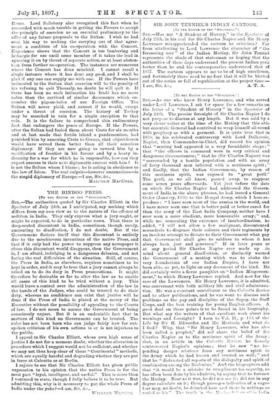HE HINDOO PRESS.
pro THE EDITOR OF THE •` SPECTATOR."' Sin,—The authorities quoted by Sir Charles Elliott in the Spectator of July 24th, as I anticipated, say nothing which differs from my own view as to the nature of the offence of sedition in India. They only express what a jury ought, or might be expected, to do in particular cases. That there is deep-seated discontent in India, sometimes, though rarely, amounting to disaffection, I do not doubt. But if the Government flatters itself that this discontent is entirely due to the mischievous inventions of the native Press, and that if it only had the power to suppress any newspaper it chose this discontent would disappear, then the Government is, I am afraid, indulging in a dangerous delusion, and not facing the real difficulties of the situation. Still, of course, the Press in India, as elsewhere, requires sometimes to be kept in order, and it may be true that a jury cannot always be relied on to do its duty in Press prosecutions. It might therefore be desirable so far to alter the law as to enable all cases of this kind to be tried without a jury. This would leave a control over the administration of the law in the hands of the Judges, who could be trusted to do their duty, whereas no confidence can exist that justice will be done if the Press of India is placed at the mercy of the Executive without the possibility of appealing to the Courts of law. I do not mean to accuse the Government of being consciously unjust. But it is an undeniable fact that in matters of this kind no Government can be trusted. The ruler has not been born who can judge fairly how far out- spoken criticism of his own actions is or is not injurious to the public.
I appeal to Sir Charles Elliott, whose own high sense of justice I do not for a moment doubt, whether the alteration in procedure which I suggest would not be sufficient, and whether we may not thus keep clear of those "Continental" methods, which are equally hateful and degrading whether they are put in force at Calcutta or at Berlin.
I rejoice to see that Sir Charles Elliott has given public expression to his opinion that the native Press is for the most part "loyal, intelligent, and useful." This is more than I ventured to state, though I fully believe it to be true. But admitting this, why is it necessary to put the whole Press of India under the yoke P—I am, Sir, &c., WILLI k7.1






































 Previous page
Previous page